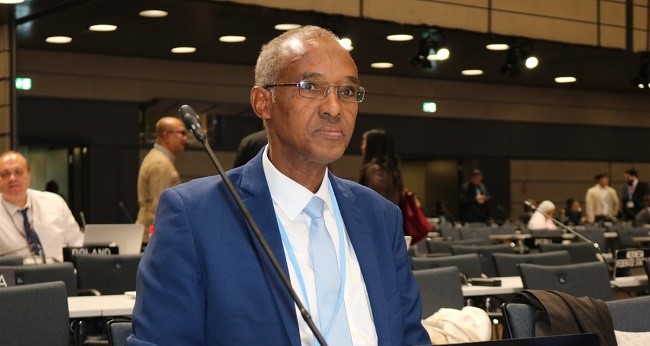Kenya’s Special Envoy for Climate Change and Chairman of the African Group of Negotiators, Amb. Ali Mohamed, has reiterated the urgent call for a need-based climate finance framework to support adaptation initiatives ahead of the COP29 summit in Baku, Azerbaijan.

Speaking when he received the position document of Kenyan Civil Society Organisations (CSOs) in his office in Nairobi on Thursday, October 31, 2024, Amb. Mohamed noted that the Baku summit “is a very important COP, and we hope it will deliver on the finance mandate”. He said climate action relies on funding, and that all mitigation and adaptation ambitions need to be matched with the needed means of implementation.
“Kenya, which chairs the African Group of Negotiators, will speak on behalf of the continent, and it is important that CSOs support the lead country and speak on behalf of Africa as well,” said Amb. Mohamed. “The climate crisis is a major concern for the whole of the continent, and Kenya in particular. Climate-induced vagaries continue to afflict us, from floods and severe drought cycles to damage to infrastructure that bleeds the economy. This, of course, is worsening Africa’s debt crisis, which is why the conversation on New Collective Quantified Goal on Climate Finance (NCQG) is crucial for us.”
A team from the Kenya Platform for Climate Governance (PACJA-Kenya), which presented the position statement on behalf of Kenyan CSOs, urged global leaders to prioritise financing mechanisms that empower grassroots climate action, particularly in vulnerable African communities, to address the escalating impacts of climate change.
The Kenyan CSOs noted that COP29, which has come to be referred to as the “Climate Finance COP”, presents a unique opportunity to reshape global climate finance policies, moving beyond past financial commitments toward a robust framework that directly supports adaptation and resilience efforts in developing nations. With urgent emphasis on community-level initiatives, Kenya’s civil society is advocating for a New Collective Quantified Goal on Climate Finance (NCQG) that centres the needs of marginalised populations – including women, youth, and Indigenous groups – who are at the forefront of climate adaptation efforts.
Amb. Mohammed urged the CSOs to use their grassroots representation advantage to highlight the impacts of the climate crisis on communities. He reiterated that the inaugural African Climate Summit, held in Nairobi under the leadership of President William Ruto in 2023, declared that Africa has the resources and capacity to take charge of its common climate future, and that negotiations at the global stage must shift from the culture of handouts and tokenism to that of development and growth.
Key Issues Highlighted by Kenyan Civil Society Organisations
1. Climate Finance Realignment for Sustainable Development: Kenyan CSOs are calling for an NCQG that directs climate finance to people-centred initiatives. These funds should primarily come from public sources and be accessible to communities without burdening developing nations with additional debt. “Climate finance must be new and additional, with mechanisms that reduce intermediaries and enhance accountability to ensure funds reach those most in need,” stated Ms Faith Ngige, the national coordinator, Kenya Platform for Climate Governance (PACJA-Kenya).
2. Urgent Investment in Adaptation and Resilience:
With an estimated $6 trillion required to fund developing nations’ climate action plans by 2030, and Africa alone needing over $3 trillion, Kenyan CSOs are urging global leaders to allocate 50% of all climate finance towards adaptation and resilience initiatives. This funding will empower local communities to lead adaptation efforts, ensuring resources are channelled to address the disproportionate climate impacts felt by African nations.
3. Enhanced Support for Locally Led Climate Actions:
The CSOs are calling for direct funding pipelines to rural and indigenous populations. Locally led solutions, particularly in sectors such as sustainable agriculture, waste management, and renewable energy, leverage local knowledge and strengthen community resilience against climate impacts. This approach fosters equitable development and reduces social instability stemming from climate-related resource conflicts.
4. Equitable Global Climate Governance and Accountability:
Kenyan CSOs are emphasizing the need for an inclusive approach to climate governance, ensuring that developing nations have a seat at the table in shaping global climate policies. The Kenyan delegation urged COP29 to establish accountability mechanisms that enforce climate commitments and protect the most vulnerable communities, with a focus on justice, transparency, and equitable outcomes.
Roadmap to COP29: Key Recommendations from Kenyan CSOs
In the lead-up to COP29, Kenyan CSOs outlined a comprehensive set of recommendations aimed at fostering climate justice and equity:
1. Implementing a Need-Based NCQG to support transformative, people- centred climate actions, particularly for marginalised communities, and reduce dependency on high-interest private loans.
2. Prioritising Adaptation Financing to safeguard vulnerable populations, advocating that half of all climate funds focus on adaptation.
3. Accelerating Renewable Energy Adoption to support clean, people- centred energy solutions that reduce emissions, create green jobs, and drive sustainable development.
4. Strengthening Nature-Based Solutions to tackle biodiversity loss and climate impacts, with an emphasis on community involvement in conservation and restoration efforts.
5. Fostering Inclusivity and a Rights-Based Approach to climate action that protects Indigenous rights, promotes gender equity, and enhances local decision-making.
A Call for Collective Action
Amb. Mohamed expressed his support for the CSOs’ plan to champion the “Keep Your Promise Campaign” at COP29, urging global actors to honour their commitments and adopt an NCQG that empowers grassroots climate action. This framework will support local solutions and contribute to a just and resilient future for Africa and the world.
